Contents
Other years |
| Countries of the United Kingdom |
| Scotland |
Events from the year 1710 in Great Britain .
Other years |
| Countries of the United Kingdom |
| Scotland |
Events from the year 1710 in Great Britain .
The 1700s decade ran from January 1, 1700, to December 31, 1709.

1710 (MDCCX) was a common year starting on Wednesday of the Gregorian calendar and a common year starting on Sunday of the Julian calendar, the 1710th year of the Common Era (CE) and Anno Domini (AD) designations, the 710th year of the 2nd millennium, the 10th year of the 18th century, and the 1st year of the 1710s decade. As of the start of 1710, the Gregorian calendar was 11 days ahead of the Julian calendar, which remained in localized use until 1923.
The Whigs were a political party in the Parliaments of England, Scotland, Ireland, Great Britain and the United Kingdom. Between the 1680s and the 1850s, the Whigs contested power with their rivals, the Tories. The Whigs became the Liberal Party when it merged with the Peelites and Radicals in the 1850s. Many Whigs left the Liberal Party in 1886 over the issue of Irish Home Rule to form the Liberal Unionist Party, which merged into the Conservative Party in 1912.

Anne was Queen of England, Scotland, and Ireland from 8 March 1702, and Queen of Great Britain and Ireland following the ratification of the Acts of Union 1707 merging the kingdoms of Scotland and England, until her death.

General John Churchill, 1st Duke of Marlborough, 1st Prince of Mindelheim, 1st Count of Nellenburg, Prince of the Holy Roman Empire, was an English soldier and statesman. From a gentry family, he served as a page at the court of the House of Stuart under James, Duke of York, through the 1670s and early 1680s, earning military and political advancement through his courage and diplomatic skill. He is known for never having lost a battle.
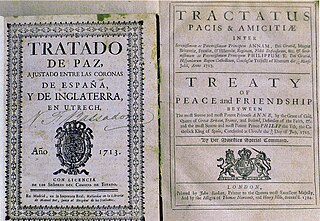
The Peace of Utrecht was a series of peace treaties signed by the belligerents in the War of the Spanish Succession, in the Dutch city of Utrecht between April 1713 and February 1715. The war involved three contenders for the vacant throne of Spain, and involved much of Europe for over a decade. The main action saw France as the defender of Spain against a multinational coalition. The war was very expensive and bloody, and finally stalemated. Essentially, the treaties allowed Philip V to keep the Spanish throne in return for permanently renouncing his claim to the French throne, along with other necessary guarantees that would ensure that France and Spain should not merge, thus preserving the balance of power in Europe.
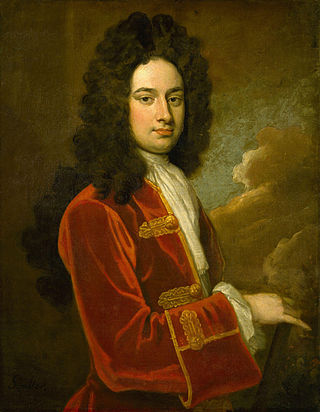
James Stanhope, 1st Earl Stanhope was a British Army officer, politician, diplomat and peer who effectively served as Chief Minister between 1717 and 1721. He was also the last Chancellor of the Exchequer to sit in the House of Lords.
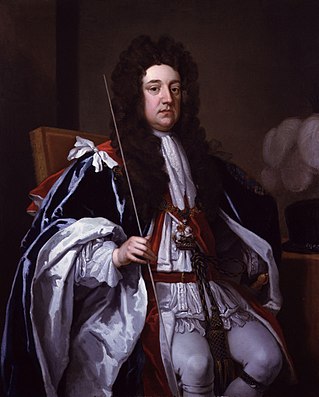
Sidney Godolphin, 1st Earl of Godolphin, was an English Tory politician and peer. He was a Privy Councillor and Secretary of State for the Northern Department before he attained real power as First Lord of the Treasury. He was instrumental in negotiating and passing the Acts of Union 1707 with Scotland, which created the Kingdom of Great Britain. He had many other roles, including that of Governor of Scilly.
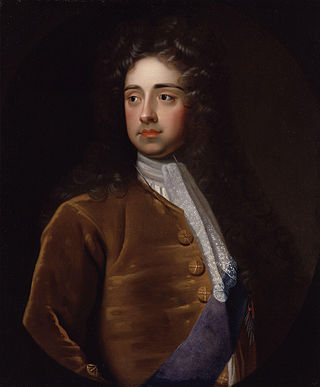
Charles Talbot, 1st Duke of Shrewsbury was an English peer and Whig politician who was part of the Immortal Seven group that invited William of Orange to depose King James II of England during the Glorious Revolution. He was appointed to several minor roles before the revolution, but came to prominence as a member of William's government. Born to Roman Catholic parents, he remained in that faith until 1679 when—during the time of the Popish Plot and following the advice of the divine John Tillotson—he converted to the Church of England. Shrewsbury took his seat in the House of Lords in 1680 and three years later was appointed Gentleman-Extraordinary of the Bedchamber, suggesting he was in favour at the court of Charles II.

Robert Harley, 1st Earl of Oxford and Earl Mortimer, KG PC FRS was an English statesman and peer of the late Stuart and early Georgian periods. He began his career as a Whig, before defecting to a new Tory ministry. He was raised to the peerage of Great Britain as an earl in 1711. Between 1711 and 1714 he served as Lord High Treasurer, effectively Queen Anne's chief minister. He has been called a prime minister, although it is generally accepted that the de facto first minister to be a prime minister was Robert Walpole in 1721.
The Tories were a loosely organised political faction and later a political party, in the Parliaments of England, Scotland, Ireland, Great Britain and the United Kingdom. They first emerged during the 1679 Exclusion Crisis, when they opposed Whig efforts to exclude James, Duke of York from the succession on the grounds of his Catholicism. Despite their fervent opposition to state-sponsored Catholicism, Tories opposed his exclusion because of their belief that inheritance based on birth was the foundation of a stable society.

Thomas Parker, 1st Earl of Macclesfield, was an English Whig politician who sat in the House of Commons from 1705 to 1710. He was Lord Chief Justice from 1710 to 1718 and acted briefly as one of the regents before the arrival of King George I in Britain. His career ended when he was convicted of corruption on a massive scale and he spent the later years of his life in retirement at his home, Shirburn Castle in Oxfordshire.

This is a list of the principal Ministers of the Crown of the Kingdom of England, and then of the Kingdom of Great Britain, from May 1702, at the beginning of the reign of Queen Anne. During this period, the leaders of the ministry were Lord Godolphin and the Duke of Marlborough.
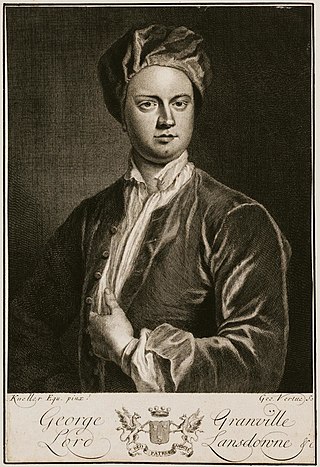
George Granville, 1st Baron Lansdowne PC, of Stowe, Cornwall, was an English Tory politician who sat in the English and British House of Commons from 1702 until 1712, when he was raised to the peerage as Baron Lansdown and sat in the House of Lords. He was Secretary at War during the Harley administration from 1710 to 1712. He was also a noted poet and made a name for himself with verses composed on the visit of Mary of Modena, then Duchess of York, while he was at Cambridge in 1677. He was also a playwright, following in the style of John Dryden.

The 1710 British general election produced a landslide victory for the Tories. The election came in the wake of the prosecution of Henry Sacheverell, which had led to the collapse of the previous government led by Godolphin and the Whig Junto.
Events from the year 1702 in England. This year sees a change of monarch.
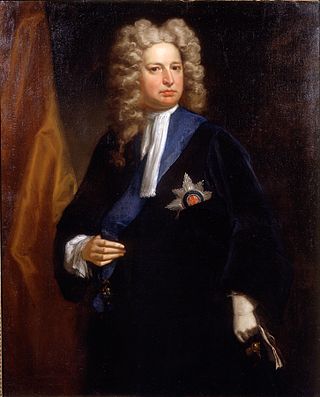
The Harleyministry was the British government that existed between 1710 and 1714 in the reign of Queen Anne. It was headed by Robert Harley and composed largely of Tories. Harley was a former Whig who had changed sides, bringing down the seemingly powerful Whig Junto and their moderate Tory ally Lord Godolphin. It came during the Rage of Party when divisions between the two factions were at their height, and a "paper war" broke out between their supporters. Amongst those writers supportive of Harley's government were Jonathan Swift, Daniel Defoe, Delarivier Manley, John Arbuthnot and Alexander Pope who clashed with members of the rival Kit-Kat Club.

Arthur Maynwaring or Mainwaring, of Ightfield, Shropshire, was an English official and Whig politician who sat in the English and British House of Commons from 1706 to 1712. He was also a journalist and a polemic political author.
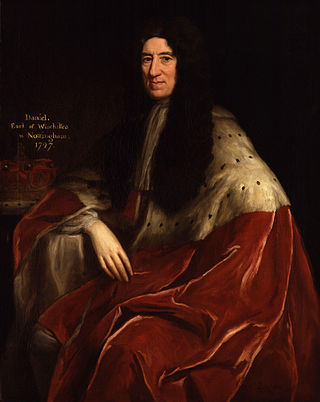
No Peace Without Spain was a popular British political slogan of the early eighteenth century. It referred to the ongoing War of the Spanish Succession (1701–1714) in which Britain was a leading participant. It implied that no peace treaty could be agreed with Britain's principal enemy Louis XIV of France that allowed Philip, the French candidate, to retain the Spanish crown. The term became a rallying cry for opposition to the Tory government of Robert Harley, Earl of Oxford and the terms of the Treaty of Utrecht.

Hanoverian Tories were Tory supporters of the Hanoverian Succession of 1714. At the time many Tories favoured the exiled Jacobite James Francis Edward Stuart to take the British and Irish thrones, while their arch rivals the Whigs supported the candidacy of George, Elector of Hanover.